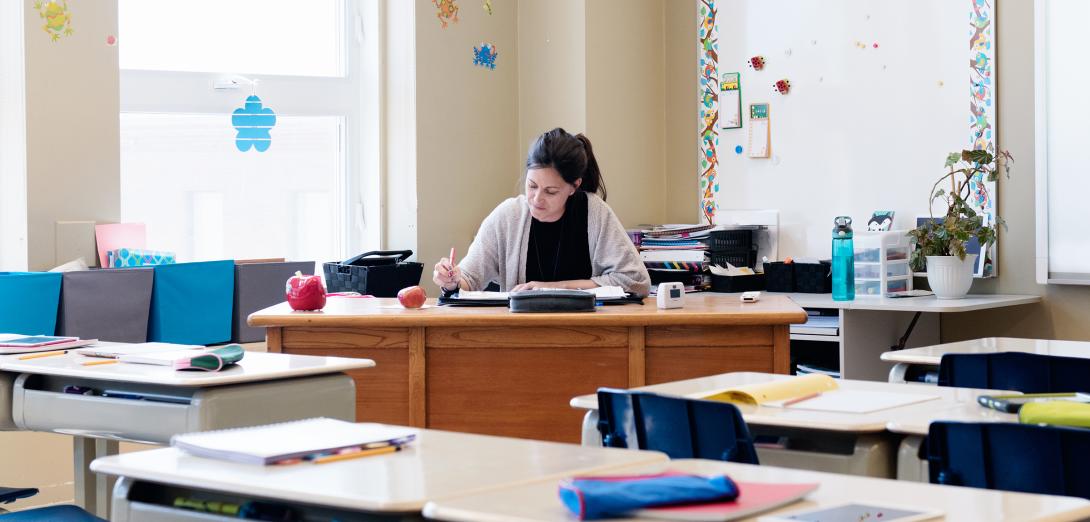Teachers, school and jurisdiction leaders have a professional responsibility to keep abreast of new developments in education and to continue to develop their professional practice. Professional growth means the career-long learning process whereby a teacher, school and school jurisdiction leaders annually develop and implement plans to achieve professional learning objectives or goals that are consistent with their relative professional practice standard(s).
The Teaching Quality Standards
Each professional practice standard describes competent practice for the teaching profession in Alberta and is supported by competencies and indicators appropriate to individuals at different stages in their careers. The applicable standard applies to certification, professional development, and supervision and evaluation processes. In all instances, reasoned professional judgment must be used to determine whether the applicable standard is being met.
Self-assessment of learning needs
Professional growth plans must reflect the teacher’s self-assessed learning needs.
Source: Alberta Education Policy 2.1.5 (Teacher Growth, Supervision and Evaluation)
Teachers develop their professional practice throughout their entire career, so self-assessment should be built into professional growth.
Prepare for review or approval of your growth plan
Initial review or approval of the growth plan
Once you have developed your professional growth plan, you will meet with the school principal or designated group of teachers to present and discuss it. School principals will meet with the superintendent or designate to present and discuss their professional growth plan.
The Teacher Professional Growth, Supervision and Evaluation Policy (Policy 2.1.5) states:
A teacher employed by a school authority or ECS operator:
(c) must submit for review or approval at a time specified in the policy that annual teacher professional growth plan to:
(i) the principal
(ii) a group of teachers delegated by the principal, if such delegation is provided in the policy
The purpose of the review process is to
- empower the teacher in setting professional learning goals and the review process,
- encourage professional reflection and collegial dialogue,
- link professional development to improved practice and the Teaching Quality Standard or the Leadership Quality Standard,
- discuss the support and resources required to facilitate future professional growth,
- discuss the teacher’s role in achieving school and district goals, and
- promote a collegial model for professional growth.
Your school division’s policy will stipulate
- whether the teacher growth plan will be submitted to the school principal for review or approval;
- whether the principal can delegate the review or approval of the teacher growth plan to a group of teachers, such as the school professional development committee, the leadership team or the professional learning team (a group of teachers having the same curriculum or grade level);
- timelines for the submission of professional growth plans, as well as review and approval; and
- discipline procedures for the failure to submit an annual professional growth plan within policy guidelines.
The teacher’s role in the initial review or approval process is to
- be prepared for the review or approval process;
- lead the discussion (after all, the teacher owns the growth plan);
- provide a rationale for the goals and strategies identified in the plan;
- lead the administrator through the critical parts of the growth plan; and
- identify resources that may help support the growth plan.
The school administrator’s role in the initial review or approval process is to
- link information gained through supervision into the reflective questions asked of the teacher (for example, “We discussed the work you were doing with assessment for learning during our last conversation. How is that coming along and could you see it becoming something that you would include?”);
- ask reflective rather than evaluative questions;
- help to identify the resources needed to complete the growth plan; and
- provide encouraging feedback for the professional learning and growth to be undertaken.
Implementing the plan
The plan is a guide to professional growth rather than a recipe to be followed without question. Think of it as a proposal that needs to be scrutinized and reflected on. Ask yourself, “Is the plan working? Do I see change? Does the plan need more work? Have I underestimated the resources or time needed?”
Document your strategies or activities undertaken and collect evidence along the way by using portfolios, reflective journals, samples or artifacts of student work, where appropriate, feedback received and so on. Be aware that change and movement toward your goal will take time.
The principal/supervisor needs to be aware of your progress and informed of any major changes to the plan. You retain ownership of the plan, but the principal/supervisor should assist you in implementing it. Discuss the situation with your principal/supervisor before changing your growth plan.
Your role in the implementation phase is to
- identify strategies and resources (financial and human) required to fulfill the growth plan;
- establish collaborative support, if needed;
- schedule strategies/activities that involve others or require prior approval;
- seek out strategies/activities and resources to support implementation of your plan;
- be aware of and follow school and district policy and administrative practices;
- keep records of your progress and measures that you have used to demonstrate your progress;
- inform your administrator of any changes, challenges and short-term successes; and
- be proactive in scheduling your year-end review conference.
Your supervisor’s role in the implementation phase is to
- help you implement your growth plan;
- gather information regarding your progress;
- be aware of the learning needs of all teachers on staff and keep them up to date with materials, PD opportunities and information about new developments in their area of professional growth;
- show an ongoing interest in the implementation and attainment of growth plan goals; and
- recognize the hard work, commitment and accomplishments of each teacher.



